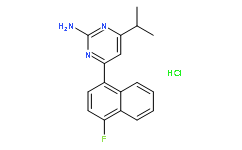
 COA COA |
 MSDS MSDS |
 HPLC HPLC |
 NMR NMR |
| CAS No: | 199864-87-4 |
| Molecular formula(MF) | C17H16FN3 |
| Molecular Weight(MW): | 281.33 |
| Alias |
| In vitro | DMSO | 56 mg/mL (199.05 mM) |
|---|---|---|
| Ethanol | 8 mg/mL (28.43 mM) | |
| Water | <1 mg/mL | |
| In vivo |
| Description | RS-127445 is a selective 5-HT2B receptor antagonist with pKi of 9.5 and pIC50 of 10.4, exhibits >1000-fold selectivity against other 5-HT receptors. | ||||
|---|---|---|---|---|---|
| Targets |
|
||||
| In vitro |
RS-127445 is a novel high affinity, selective 5-HT2B receptor antagonist devoid of detectable intrinsic activity. RS-127445 is found to have nM affinity and 1000 fold selectivity for the 5-HT2B receptor. RS-127445 is thus among the highest affinity, most selective 5- HT2B receptor ligands. RS-127445 potently blocks the 5-HT evoked increase in inositol phosphate formation and blocks the 5-HT evoked increases in intracellular calcium concentrations with a potency 1000 times greater than that of yohimbine. [1] |
||||
| In vivo | RS-127445 is readily absorbed with no obvious dose or route-dependent limitations and rapidly absorbed following both oral and intraperitoneal administration with peak plasma concentrations being achieved within 15 min of dosing. RS-127445 concentration in the plasma are proportional to the administered dose. RS-127445 administrated at dose of 5 mg/kg with approximately 60% of an intraperitoneal dose and 14% of the oral dose is bioavailable. RS-127445 concentration in the plasma is predicted to fully saturate accessible 5-HT2B receptors can be readily achieved and maintained in the rat. RS-127445 administered at 1 to 10 mg/kg with oral significantly inhibits visceral hypersensitivity up to 35 to 74% provoked by restraint stress. Oral RS-127445 produces a significant suppression of TNBS-induced visceral hypersensitivity (15 to 62% inhibition at 3 to 30 mg/ kg), although RS-127445 has no significant effect on the visceral nociceptive threshold of native rats. RS-127445 administrated orally with 1 to 30 mg/kg also dose -dependently reduce the restraint stress-induced defecation in native and TNBS-treated rats. [2]. RS-127445 inhibits colonic motility and defecation. [3] |